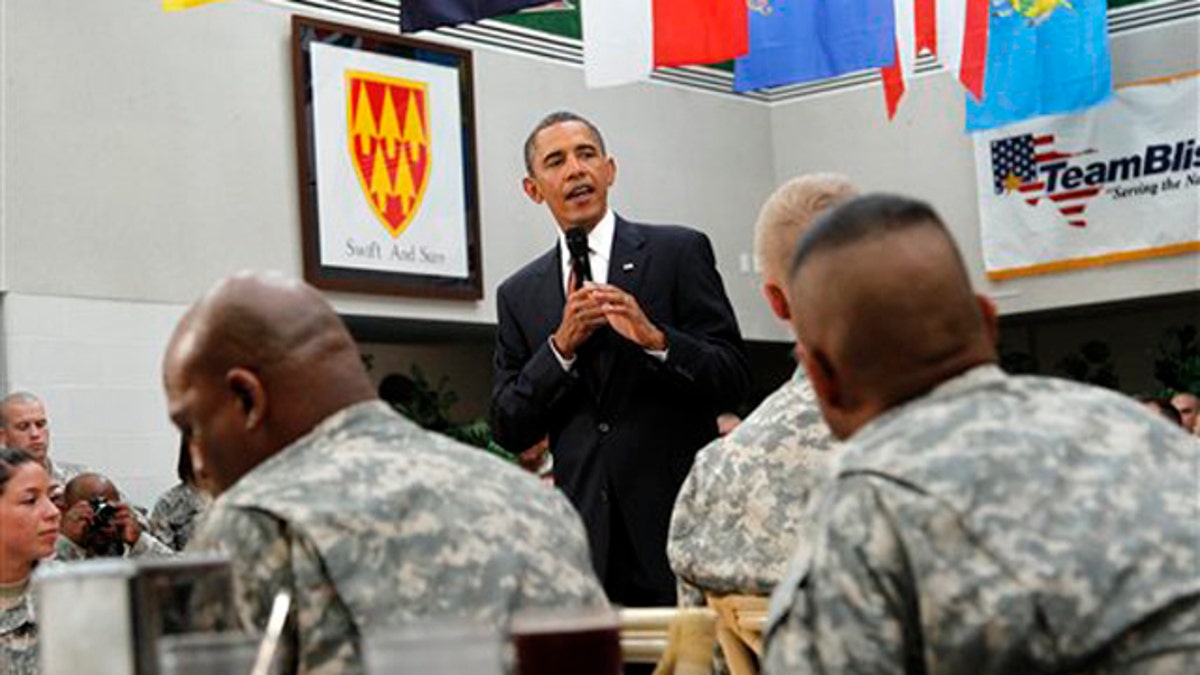
President Obama speaks to members of the military Aug. 31 at Fort Bliss in El Paso, Texas. (AP Photo)
President Obama met with troops Tuesday afternoon at Fort Bliss in Texas, a brief stopover that sets the stage for an Oval Office address in which the president will formally mark the end of combat operations in Iraq.
During the visit, Obama offered the troops "congratulations on a job well done." He said the U.S. military will continue to pursue terrorists but that the combat phase is over.
The president hits the milestone as a political stalemate grips Baghdad and the threat of violence looms. Though the last combat brigade has left the country, the White House is trying to manage expectations for the final product of a war Obama vocally opposed as a state and U.S. senator.
The White House says it has no plans to declare "mission accomplished" Tuesday night, but describes the "transition" to Iraqi responsibility as a key step.
"This is not a victory lap," White House Press Secretary Robert Gibbs told Fox News. "You're not going to see any 'Mission Accomplished' banners that'll be unfurled. ... We understand that violence will still continue. We understand we still have troops there."
Obama will formally end a combat mission that lasted more than seven years and left more than 4,400 U.S. troops dead. The upcoming speech has triggered speculation about the extent to which Obama will acknowledge his predecessor's role in laying the groundwork for withdrawal.
Obama, who opposed the 2007 troop surge, called former President Bush while aboard Air Force One Tuesday en route to Texas, according to White House spokesman Bill Burton. He described the conversation as "private" and lasting a "few minutes."
Gibbs did not answer questions about whether Obama would credit Bush in his speech.
But Senate Republican Leader Mitch McConnell, in prepared remarks, urged Obama to "reject your own campaign rhetoric" about the surge, and to continue basing U.S. involvement on "conditions on the ground."
"This president could very well find himself negotiating a new security agreement next year," McConnell said.
Sen. Joe Lieberman, I-Conn., credited both presidents for their resolve on the war.
"The remarkable turnaround in Iraq is due to many factors, but it would not have been possible without the courageous decision of President Bush to launch the surge in 2007 -- initiating a set of policies that President Obama, to his great credit, has sustained and built upon to bring us to this day," Lieberman said in a written statement.
The White House sees Tuesday's benchmark as a promise kept and has gone to great lengths to promote it as such, dispatching Vice President Joe Biden to Iraq to preside over a formal change-of-command ceremony and raising Tuesday night's remarks to the level of an Oval Office address, something Obama has only done once before.
Among Obama's goals on Tuesday is honoring those who have served in Iraq since the March 2003 invasion, many returning to the battlefield for multiple tours of duty. Gibbs said Monday that while the Iraq war would have never happened had Obama been commander in chief at the time, the president holds the service and sacrifice of the troops in high regard.
Since the start of the war, 200,000 personnel from Fort Bliss have deployed to Iraq, serving in every major phase of the war. Fifty-one soldiers from the base died there and many more were wounded.
Last week, some 600 soldiers from the 1st Brigade Combat Team returned to the base as part of Obama's self-imposed Aug. 31 deadline for having all U.S. combat troops out of Iraq. Just about 50,000 U.S. troops will remain, down from a peak of nearly 170,000 in 2007. U.S. troops will no longer be allowed to go on combat missions unless requested and accompanied by Iraqi forces.
Administration officials have been careful to avoid equating the end of the combat mission with a mission accomplished. That was the phrase on the now-infamous banner that flew on an aircraft carrier seven years ago when Bush declared an end to major combat operations in Iraq, a symbol the Bush White House came to deeply regret as the war dragged on.
"You won't hear those words coming from us," Gibbs said Monday. "Obviously tomorrow marks a change in our mission."
Under a security agreement signed between the U.S. and Iraq before Obama took office, all U.S. forces must leave Iraq by the end of 2011. But the Obama administration insists the U.S. is not abandoning Iraq and is ramping up a diplomatic corps to help stabilize the country's government and economy over the coming years.
The Associated Press contributed to this report.












































